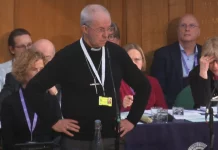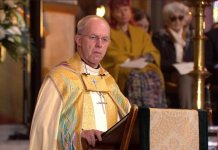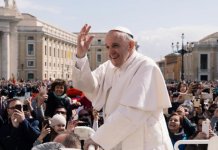The Kigali Commitment of April 21, 2023, was a shot heard around the world. Thirteen hundred Anglican leaders, dominated by bishops and clergy from the Global South, gathered in Kigali, Rwanda, to declare that they no longer recognized the Archbishop of Canterbury as their leader. Representing 85 percent of the Anglican Communion, they pronounced their determination to “reset the Communion on its biblical foundations.”
The boldness of this statement is striking. Not only does it signal the end of English domination of the Communion, but it also demonstrates counter-cultural courage. The leaders of the Global Anglican Fellowship Conference (GAFCON) and the Global South Fellowship of Anglican Churches (GSFA) have defied Global North elite opinion and financial coercion by denouncing the Church of England’s February 2023 decision to bless same-sex couples. This was, as Kigali puts it, “to bless sin.” It is “pastorally deceptive and blasphemous . . . violates the created order . . . and endangers salvation.” The bishops who signed off on the blessing are betraying their “ordination and consecration vows to banish error and uphold and defend the truth taught in Scripture.”
Archbishop of Canterbury Justin Welby had called on Communion members who disagreed on this crucial issue to “walk together” in “good disagreement.” Kigali refused: “We reject the claim that two contradictory positions can both be valid in matters affecting salvation.”
We applaud our Anglican bishops’ willingness to reject neocolonial demands to accept the hegemony of the sexual revolution. But we are concerned that in an admirable attempt to resist the liberal project, they unwittingly have themselves opened the door to the use of Scripture for liberal ends. The Kigali Commitment repeatedly appeals to the authority of the Bible alone and fails to mention either the authority of the Church or the role of tradition, describing the Bible as “the rule of our lives” and the “final authority in the church” without mentioning that Scripture functions within the context of tradition—in particular, the common liturgy of the Church and the Book of Common Prayer—and the Church’s teaching authority.
The divine Scriptures are indeed the ultimate authority for matters of doctrine. The Church has no authority to define dogma that the Scriptures do not already contain or to admit heretical teachings that contradict them. But a strict sola scriptura hermeneutic, which fails to recognize the Bible’s origin in the ancient Church and its authoritative interpretation by the Church fathers and creeds, opens the way to a liberal method in which every reader serves as his own authority.
To forestall liberal interpretations of Holy Scripture, the Kigali Commitment appeals to the “plain reading” of the text and to the “clarity” of Scripture, and insists that Scripture is “its own interpreter.” But the Church cannot avoid interpreting the Scriptures, and she must do so faithfully, in line with sacred tradition. Without tradition as norm and guide, the canonical context and clarity of Scripture are meaningless.
Kigali’s strict “Bible alone” viewpoint is also a departure from the approach of the English Reformers. Anglicanism’s Thirty-Nine Articles were not finalized until 1571, fifteen years after the martyrdom of Thomas Cranmer. In that year, the bishops of the Church of England declared in canon law (canon 6) that preachers were not to teach anything contrary to the Bible and “what the Catholic fathers and ancient bishops have collected from this selfsame doctrine.” One’s interpretation of the Thirty-Nine Articles must “in all respects agree with” the fathers and ancient bishops.
In his Apology of the Church of England (1562), Bishop John Jewell, likewise, insisted that the doctrine of the English Reformation was “consonant to the words of Christ and the writings of the apostles, and the testimonies of the catholic fathers.”
The English Reformation lasted for a century, highlighted by the work of Richard Hooker (1554–1600), whose massive Laws of Ecclesiastical Polity illustrate the Anglican way of reading Scripture and life: to read the Bible while sitting at the feet of the fathers. Hooker turned to the fathers 774 times in his Laws, as often to the Latin as to the Greek and African fathers. Tertullian and Augustine were his favorites.
Hooker appealed ninety-nine times to the great bishop of Hippo, either to justify an Anglican practice or to interpret a controverted passage of Scripture. In one of his arguments against Puritans, for example, Hooker refuted the regulative principle that everything in Church government and worship must have an explicit biblical—preferably New Testament—prooftext. Augustine recognized, according to Hooker, that while the most important Christian doctrines are clear in Scripture to those willing to see, many matters of Church polity and worship are either unclear or not addressed. Therefore, Church leaders are free to use reason and charity to keep traditional practices that do not violate the clear teaching of Scripture. Hooker quotes Augustine, “The custom of the people of God and the decrees of our forefathers are to be kept, touching those things whereof the Scripture hath neither one way or other given us any charge.”
Hooker recognized that there is no such thing as Scripture without tradition, that every person reads Scripture through the lens of some tradition or other, whether he realizes it or not. Even Jehovah’s Witnesses, proud proclaimers of sola scriptura, use a hermeneutical tradition—in their case, one that interprets Christological passages in an Arian framework. So, the question is not whether we use tradition to understand Scripture, but which tradition has guided and should guide our interpretation. Hooker used sixteen hundred years of patristic, medieval, and Reformation tradition for his interpretation, privileging the fathers.
Bishop Francis White (1564–1638) was an important Caroline divine who continued the Anglican Reformation hermeneutic of reading Scripture within patristic tradition. As bishop of Ely, one of England’s most influential sees, White wrote that “the Church of England in her public and authorized Doctrine and Religion” looks to Scripture as “her main and prime foundation” but also “relieth upon the consentient testimony and authority of the bishops and pastors of the true and ancient Catholic Church; and it preferreth the sentence thereof before all other curious and profane novelties.” Bishop White was suggesting a method that has been called prima scriptura rather than the oft-misunderstood sola scriptura.
Recent non-Anglican evangelical theologians have also recognized the danger of a doctrine of sola scriptura that devolves into nuda scriptura. In a 2002 statement of Evangelicals and Catholics Together, they write:
We who are Evangelicals recognize the need to address the widespread misunderstanding in our community that sola scriptura (Scripture alone) means nuda scriptura (literally, Scripture unclothed; i.e., denuded of and abstracted from its churchly context). The phrase sola scriptura refers to the primacy and sufficiency of Scripture as the theological norm—the only infallible rule of faith and practice—over all tradition rather than the mere rejection of tradition itself. The isolation of Scripture study from the believing community of faith (nuda scriptura) disregards the Holy Spirit’s work in guiding the witness of the people of God to scriptural truths, and leaves the interpretation of that truth vulnerable to unfettered subjectivism.
The ECT statement is consonant with the historic Anglican approach to Scripture and ancient Church tradition. Scripture is the manna in the Ark of the ancient Church, which when removed from the protection of the Ark will spoil into poison that false teachers use to manipulate souls.
Read it all at First Things










